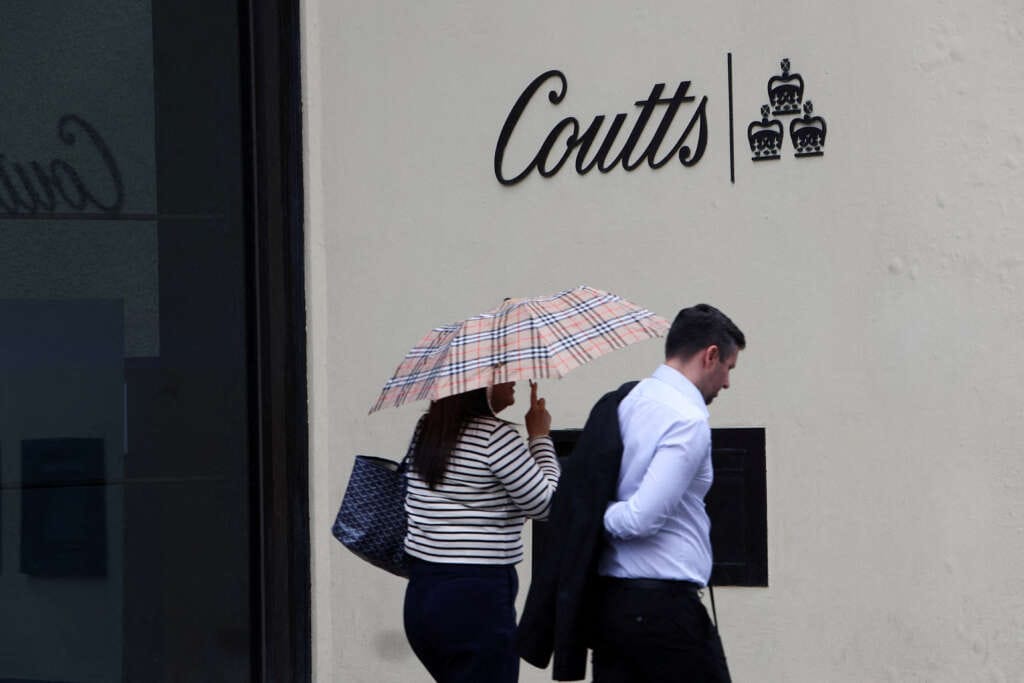
UK banks back in political crosshairs after Farage fiasco
By Sinead Cruise, Iain Withers and Lawrence White
LONDON (Reuters) -After more than a decade trying to rehabilitate their image since an era of bailouts and mis-selling scandals, Britain’s banks are once again a target for public – and political – ire.
What started as a dispute between former Brexit Party leader Nigel Farage and NatWest-owned Coutts over the closure of his accounts has spiralled into a political and media storm that has cost NatWest its CEO and reopened old wounds about government intervention in the banking sector.
The fallout marks a watershed moment in relations between NatWest and the U.K. government, which remains its biggest shareholder following its taxpayer-funded rescue in 2008, with a stake it says is managed at “arm’s length”.
Yet the episode has also highlighted how easily UK financial firms can be buffeted between political factions that have deepened since Brexit, ahead of the country’s return to the polls before January 2025.
“The culture wars are coming to UK businesses, including the financial sector,” said Andre Spicer, dean of City University’s Bayes Business School.
NatWest chairman Howard Davies said the political backlash ultimately led to the shock departure of CEO Alison Rose – the most senior woman in UK banking – after the pair agreed it would be too tough for Rose to continue. The finance ministry says it was the decision of the bank’s board.
The affair also claimed the job of Peter Flavel, CEO of the 330-year-old private bank Coutts, which counted author Charles Dickens and Queen Elizabeth II as clients.
While NatWest made several key errors, the force of the backlash – including against the group’s environmental and social policies – also had echoes of culture wars more commonly waged in corporate America, Spicer said.
Concern about political influence on the NatWest boardroom also comes at a time of heightened pressure from lawmakers on the wider banking sector, which has been accused by parliament’s Treasury committee of “profiteering” for failing to pass on more of the benefit of higher central bank rates to struggling savers.
Harriet Baldwin, chair of the cross-party Treasury committee, said on Friday that banks should be forced to let customers know when better savings rates are available elsewhere.
“Given that the government, regulator and the Governor of the Bank of England agree that action is required, the time for foot dragging and weak excuses is over,” she said in a statement.
DANGERS OF ‘PURPOSE’
NatWest’s Rose stepped down on Wednesday after admitting to a “serious error of judgment” in discussing Farage’s relationship with the bank with a BBC journalist.
While this has been branded a breach of client confidentiality – considered a cardinal sin in banking – some CEOs of rival banks have offered a modicum of sympathy.
“That’s a pretty, pretty heavy price to pay for what would appear to be an error of judgment,” Bill Winters, CEO of Standard Chartered, said on Friday.
Politicians from both major parties criticised NatWest after an internal review emerged showing a Coutts reputational risk committee had said Farage’s views did not align with the lender’s own.
The review showed the committee decided to cut ties with Farage after a mortgage he had taken out had expired, and referred to the extra cost of managing the accounts of high profile individuals. It also cited “risk factors including… controversial public statements which were felt to conflict with the bank’s purpose”.
Samuel Gregg, economist with the American Institute for Economic Research, said the case showed why company leaders had to be wary of wading into public debates.
“Banks have ended up caught in British political crossfire because they have been ‘co-opted’ into supporting an array of causes, left and right, instead of focusing on delivering profits and shareholder value,” Gregg said.
But a board advisory consultant, who declined to be named, said banks had little choice but to engage in environmental and social issues as they were often pushed to do so from regulators and investors.
The government has kept up the pressure on the entire sector, and last week fast-tracked reforms that will force all lenders to delay and better explain account closures.
The Farage storm has driven renewed activity online from customers complaining they too have been ‘debanked’. A Facebook group named ‘NatWest CLOSED down my ACCOUNT’ has attracted more than 10,800 members.
However, data from watchdog the Financial Ombudsman Service showed complaints about account closures represented a tiny fraction of a bank’s overall customer base. Barclays received the most last year, at 274, followed by NatWest with 234.
ROGUE COMMITTEES?
Experts say other banks will now be scrambling to ensure their own policies and committees are behaving appropriately, to avoid further scandals.
“So far, this is specific to NatWest. But what you tend to get when any scandal blows up is a negative halo effect – that means investors and activists start looking around at other institutions,” said City University’s Spicer.
The CEO of Britain’s biggest domestic bank Lloyds said on Wednesday the bank’s own policies did not include looking at customers’ political or personal beliefs.
Rupert Younger, founder of the Centre for Corporate Reputation at Oxford University’s Said Business School, said banks had to ensure their own committees did not “over-reach” and get involved in inappropriate areas.
“It’s a classic when you have a committee that decides it needs to become relevant, and it starts to flex its muscles in ways it shouldn’t,” said Younger. “In this case they created a reputation crisis that didn’t exist in the first place.”
(Reporting by Sinead Cruise, Iain Withers and Lawrence White; Editing by Daniel Wallis)


